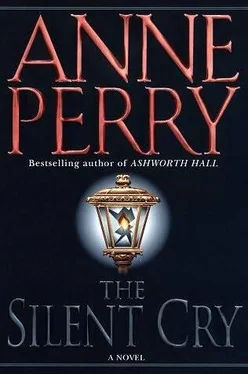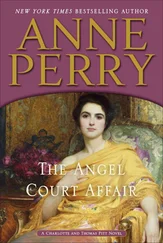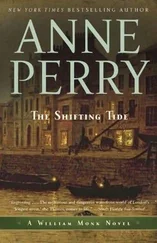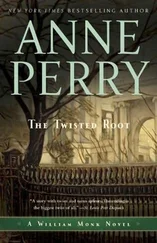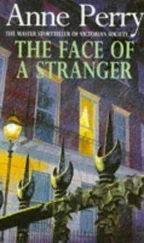Monk nodded, hesitated a moment, then excused himself and went out to go home and bathe and sleep. Then he must go and tell Rathbone.
The trial of Rhys Duff had commenced on the previous day. The court was filled and an hour before it began the ushers closed the doors. The preliminaries had already been conducted. The jury were chosen. The judge, a handsome man of military appearance and the marks of pain in his face, called the court to order. He had come in with a pronounced limp and sat a trifle awkwardly in his high, carved chair in order to accommodate a stiff leg.
The prosecution was conducted by Ebenezer Goode, a man of curious and exuberant appearance, well known and respected by Rathbone. He was unhappy with proceeding against someone as obviously ill as Rhys Duff, but he abhorred not only the crime with which he was charged, but the earlier ones which had provided the motive. He willingly made concession to Rhys's medical needs by allowing him to sit in the dock, high above the body of the court and railed off, in a padded chair to offer what comfort there was for his physical pain. He also had made no demur when Rathbone had asked that Rhys not be handcuffed at any time, so he might move if he wished, or was able to, and sit in whatever position gave him the least discomfort.
Corriden Wade was in court and could be called should he be needed, and so was Hester. They were both to be allowed immediate access to the prisoner if he showed any need for their attention or assistance.
Nevertheless as the testimony began, Rhys was alone as he faced a bitterly hostile crowd, his accusers and his judges. There was no one to speak for him except Rathbone, standing a solitary figure, black-gowned, white-wigged, a fragile barrier against a tide of hatred.
Goode called his witnesses one after the other: the women who had found the two bodies, Constable Shotts and John Evan. He took Evan carefully step by step through his investigation, not dwelling on the horror but permitting it to be passionately conveyed through Evan's white face and broken, husky voice.
He called Dr. Riley who spoke quietly and in surprisingly simple language of Leighton Duffs terrible wounds and the death he must have suffered.
"And the accused?" Goode asked, standing in the middle of the floor like a great crow, his arms dangling in his gown. His aquiline face with its pale eyes reflected vividly the horror and the sense of tragedy he felt unmistakably deeply.
Hester had liked him ever since first meeting him in the Stonefield case. Staring around the courtroom, more to judge the emotion of the crowd than to note who was present, she was lent a moment's real happiness to see Enid Ravensbrook, her face smoothed of its earlier suffering, her eyes gentle and bright as she watched Goode, a smile on her lips. Hester looked more closely, and saw there was a gold wedding band on her hand, not the one she had worn earlier, but a new one. For an instant she forgot the present ache of fear and tragedy.
But it was brief. Reality returned with Riley's answer.
"He was also very severely injured," he said quietly.
There was barely a sound in the room. There were faint rustles, tiny movements, a sigh of breath. The jurors never took their eyes from the proceedings.
"A great deal of blood?" Goode pressed.
Riley hesitated.
No one moved.
"No…" he said at last. "When a person is kicked and punched there are terrible bruises, but the skin is not necessarily broken. There was some, especially where his ribs were cracked. One had pierced the skin. And on his back. There the flesh had been ripped.”
There was a gasp of indrawn breath in the room. Several of the jurors looked very white.
"But Sergeant Evan said that the accused's clothes were soaked in blood, Dr. Riley," Goode pointed out. "Where did that come from, if not from his injuries?”
"I assume from the dead man," Riley replied. "His wounds were more severe, and there were several places where the skin was broken. But I am surprised he bled so badly.”
"And there were no wounds on the accused to account for such blood?”
Riley pressed.
"No, there were not.”
"Thank you, Dr. Riley.”
Rathbone rose. It was a forlorn hope, but he had nothing else. He must try anything, no matter how remote. He had no idea what Monk would produce, and there were always the possibilities that involved Arthur and Duke Kynaston.
"Dr. Riley, have you any way of knowing whose blood it was on Rhys Duffs clothes?”
"No, sir," Riley answered without the least resentment. The smooth expression of his face suggested he had no conviction in the matter himself, only a sadness that the whole event should have happened at all.
"So it could belong to a third, or even a fourth person, whom we have not yet mentioned?”
"It could… were there such a person.”
The jury looked bemused.
The judge watched Rathbone anxiously, but he did not intervene.
"Thank you," Rathbone nodded. "That is all I have to ask you, sir.”
Goode called Corriden Wade, who reluctantly, pale-faced, his voice barely heard, admitted that Rhys's injuries could not have produced the blood described on his clothes. Not once did he look up to the dock where Rhys sat motionless, his face twisted in an unreadable expression, a mixture of helpless bitterness and blazing anger. Nor did Wade appear to look towards the gallery where Sylvestra sat next to Eglantyne, both of them watching him intently. He kept his eyes undeviatingly on Goode, confirming that the events of that night of his father's death had rendered Rhys incapable of communication, either by speech or by writing. He was able only to nod or shake his head. He expressed the deepest concern for his well-being, and would not commit himself to any certainty that he would recover.
Goode hesitated, as if to ask him further as to his knowledge of Rhys's personality, but after the vaguest of beginnings, he changed his mind.
There was nothing for him to prove but the facts, and to explore the growth of motive only opened the way for Rathbone to suggest insanity.
He thanked Wade and returned to his seat.
Rathbone took his place. He knew Wade was as sympathetic a witness as he would get, apart from Hester, whom he could find no excuse to call.
And yet he had nothing to ask Wade which would not do more harm than good. He needed something from Monk as desperately as he ever had, and he did not even know what to hope for, let alone to seek, or to suggest. He stood in the middle of the floor feeling alone and ridiculous. The jury were waiting for him to say something, to begin to fight back. He had done nothing so far except make a gesture about the blood, one which he knew no one believed.
Should he ask Wade about the deterioration of Rhys's character, and lay grounds for a plea of insanity… at least in mitigation? He thought it was what Sylvestra wanted. It was the only thing which was comprehensible for such an act.
But it was not a defence in law, not for Rhys. He may be evil, acting from a different set of moral beliefs from anyone else in this crowded room, but he was not insane in any sense that he did not understand either the law, or the nature of his acts. There was nothing whatever to suggest he suffered delusions.
"Thank you, Dr. Wade," he said with confidence he was far from feeling. "I believe you have known Rhys most of his life, is that correct?”
"I have," Wade agreed.
"And been his physician, when he required one?”
"Yes.”
"Were you aware of there being a serious and violent disagreement with his father, and if so, over what subject?”
It was a question to which Wade would find it extremely difficult to answer in the affirmative. If he admitted it, it would seem incompetent that he had not done anything to forestall this tragedy. It would seem like wisdom after the event, and Sylvestra would see it as a betrayal, as indeed so might some of the jury.
Читать дальше
